- Home
- Simon Beckett
Owning Jacob (1998) Page 6
Owning Jacob (1998) Read online
Page 6
And of course I don't have any problems of my own.
There was a rich smell of beeswax from the antique furniture as he went down the long, thickly carpeted hallway. From somewhere deeper in the house he could hear the murmur of Colin on the telephone. A door opened at the far end of the hall and Maggie came out. In the brown knee-length dress with its white lace collar she looked, as always, like she was caught in a 1980s Laura Ashley time warp. She faltered when she saw his hair, then, obviously deciding not to mention it, fixed her eyes on his face and smiled her stuck-on smile.
'We thought you weren't coming,' she said, jovially, but Ben knew her well enough to detect irritation at his late arrival.
'Sorry. It ran on for longer than I expected.'
'Yes, so we gathered.'
The effusive offers of help that Maggie had made after Sarah had died were clearly wearing thin. He knew he would soon have to make other arrangements for the days when he was too busy to collect Jacob from school, and hoped it wouldn't take him too long to adjust to the change in routine. Then the thought came to him that he might not have to worry about such things for much longer.
He couldn't say how that made him feel.
'He's in here,' Maggie said, going into what she called the 'TV room'. Jacob was sitting cross-legged on the floor watching Tom and Jerry do violence to each other on the big colour screen. Scott was sitting next to his younger brother. Both of them sat apart from Jacob.
'Hi, Jake, had a good day?' Ben asked, doing his best to sound cheerful. Jacob looked at him blankly for a moment, then gave him a rare smile before turning back to the TV. Ben felt pierced by it.
Colin came into the room. He had already changed into his 'at home' outfit of jeans and a T-shirt, but his solicitor's persona was so strong that the casual clothes looked unnatural on him.
'Hi, Ben, fancy a beer?'
Ben was about to decline when Colin gave him a look and jerked his head towards the door.
'Er, yeah, perhaps a quick one.'
Conscious of Maggie's disapproval, he followed Colin into the kitchen. Colin glanced back to make sure no one else had followed them, then closed the door.
'I've got you the name of a detective.'
Chapter Five
Ben couldn't park near the address Colin had given him. The road, just off Kilburn High Street, was being dug up by workmen and was down to a single lane. The yammer of pneumatic drills vibrated through Ben's skull as he walked past, each decibel a punishment for the beer, joints and finally vodka he had worked his way through the night before. The street was a rundown line of shuttered shop windows and disappearing small businesses. He slowed as he reached the number he was looking for. A disreputable-looking secondhand jeweller's was on the ground floor, but the row of buzzers by the doorway at the top of the three cracked steps indicated the presence of other occupants in the building. The sun bore down on the top of Ben's head like a Klieg light, making him squint. He shuddered as a clammy wave of nausea left him prickling with sweat. The air was full of diesel and dust from the roadworks. He took deep breaths of it anyway and went up the steps.
There was a small, clear plastic strip containing a name next to each of the buzzers. The one that said 'I.Q. Investigations' was right above the jeweller's. Ben hoped that meant it was on the first floor. He didn't think he could make it any higher than that. He pressed the buzzer and waited. There was a crackle of static and then a woman's voice said simply, 'Hello?'
'I've an appointment with Mr Quilley.' He waited for a response. After a second the door hummed as it was unlocked.
Ben pushed it open and went inside.
The hallway was lit with a flickering fluorescent strip light, redundant with the sunshine coming from windows on the stairway and at the far end. It added another notch to his headache as he passed underneath. Little fluff balls of dust were gathered in the angle of each linoleum-covered stair, and the banister wobbled beneath his hand. The first-floor landing was small, with only a single door. 'I. Quilley Investigations' was stencilled on it in scratched white paint, apparently put there before the introduction of the snappier abbreviation.
Ben tapped on the glass and heard a distant 'Come in'.
The office was long, dark and narrow. A girl and a desk were crammed into an alcove to one side, together with a battered computer monitor and a fax machine that looked as though its owners had beaten their money's worth out of it.
The girl glanced up from the computer screen, unsmiling.
'Hi,' Ben said. His head thudded. I'm Ben Murray. I spoke to Mr Quilley yesterday—' A door that Ben had assumed led into a cupboard opened and a man poked his head around it.
'Come in, Mr Murray.' The head disappeared. The girl went back to her typing.
Ben went through the door into the next room. The man was already sitting behind an old teacher's desk.
He was in his fifties. His hair was brushed straight back, mostly dark but receding in two deep bays above his temples. It had the oily sheen of Brylcreem. He waved Ben to sit down in the chair opposite with a hand that held a half-smoked cigarette and continued to write on a notepad. Ben sat down, glancing around. It was smaller but brighter than where the receptionist sulked, with a large sash window overlooking the street. The window was closed, muting the rattle of the pneumatic drills from outside but doing little to air the cramped space. The room was sour with stale cigarette smoke. Ben watched a curl of it drifting up from the stub tucked between the man's brown-stained fingers and felt queasy again.
The detective finished writing with an emphatic full stop and gave Ben a smile. 'Sorry about that.'
He had a southern Irish accent. His teeth were small and the same yellow as his fingers. Rising half out of his seat he reached across the desk and offered the hand not gripping the cigarette. He was taller than Ben would have thought, with a heavy frame folded with office flab. His palm was damp and hot when Ben shook it.
'Don't mind if I smoke, do you?' he asked, waving the cigarette with little inclination of putting it out.
'No, go ahead.'
Quilley was dragging on the filter before Ben finished speaking, the request clearly a formality. His cheeks hollowed as the tip of ash raced towards his fingers. He stubbed the cigarette out in a surprisingly elegant cut-glass ashtray that was already overflowing and let the smoke out through his nose and mouth.
'Now, Mr Murray,' he said. 'What can I do for you?'
Ben took his eyes from the twin plumes of smoke issuing from the man's nostrils. 'I, er, I want you to locate somebody for me.' The detective took a blank form from a drawer. It looked like one he had typed up and photocopied himself. 'What's their name?'
'Kale. John and Jeanette Kale.'
'Man and wife or brother and sister?'
'They're married. At least, they were, the last I heard of them.'
'And when was that?'
'Six years ago.' The detective wrote on the form without looking up. 'Can you give me any more details?' Ben told him as much as he knew from the newspaper reports. Quilley didn't interrupt, and broke off writing only to light up another cigarette. He dropped the match into the ashtray and picked up the Biro again.
'Why do you want them locating?'
'Why…?' Ben faltered.
Quilley looked up. He had a habit of half smiling that made him seem to be recalling some private joke.
'You needn't tell me, of course, but sometimes it makes my job easier. I don't like to get involved in anything without knowing the reason.'
Ben had worked out his story beforehand in case he was asked. He'd hoped he wouldn't be. 'I'm researching a book about the Gulf War. John Kale served there, and I'd…well, I'd like to interview him.' He'd decided against making any mention of the Kales' son. Lying wasn't one of his strong points, and he didn't want to give anyone any hints as to what he was really trying to find out. If the detective was any good he would learn about the abduction for himself. He might even tell Ben if the baby had been foun
d without him having to ask.
Quilley's grey eyes seemed speculative as he gazed across at Ben. 'Have you been in touch with the MOD?'
'The what?'
'Ministry of Defence.'
'Uh, no. No I haven't. Not yet.' He felt completely transparent, but the detective simply made another note.
'And when I've located the Kales, do you want me to approach them?'
'No, just…just find out where they are now, what they're doing. That sort of thing.' He hoped he sounded natural. 'I'll get in touch with them myself.'
Quilley took another deep pull on the cigarette, head bowed over the form. Smoke trailed up lazily through his hair. 'Who's publishing it?'
'Sorry?'
'The book.' The detective looked up at him again. Who's publishing it? You did say that's why you wanted to find the Kales, didn't you?'
'Oh, right.' Ben's mind raced, conscious of the man calmly watching him.
'I'm not sure yet.'
Quilley nodded, smiling faintly.
'It's still in the early stages,' Ben went on. Shut up.
The detective regarded him for a moment longer, his smile lingering, then asked for Ben's address and telephone number. He set his pen down on top of the form. 'Well, I think that's all I need to know for now. I can't say exactly how long it'll take, but I should have something for you by the end of next week. Is there anything you'd like to ask?'
'I don't think so.' Ben just wanted to get away from the hot, smoky office. He felt sure his lies were written on his face.
The detective raised his eyebrows. 'Don't you even want to know how much this is going to cost you?'
Feeling somehow at a disadvantage, Ben said he did. The detective told him a daily rate that seemed surprisingly cheap.
He agreed and pushed back his chair to leave.
'Oh, one last thing,' Quilley said, pen still in hand. 'What's your occupation?'
'Photographer.'
'Really?' The detective's half-smile was back. 'Rather unusual, a photographer writing a book, isn't it?'
You sneaky bastard. Ben stared at him coldly. 'It's mainly photographs.'
'Ah.'
'Do you need references?'
Quilley chuckled, unperturbed. 'Oh, nothing like that. I just like to know a little about who I'm working for.' He came from around the desk and opened the door for Ben. 'Leave it with me, Mr Murray. I'll be in touch.' He shook Ben's hand again. Up close his breath was heavy with coffee and cigarettes. His smile hid whatever he was thinking as Ben went out. 'And good luck with the book.'
It was a purer, more simple vision through the camera.
Sifted through the membrane of lens and filter, aperture and viewfinder, the world was changed, reality reduced to bite-sized, manageable slivers, immeasurably small fragments of time plucked out by the click of a shutter. Ben found it comforting to be able to close out the world except for that one rectangle of light, framed by blackness. He could manipulate it, make it into what he wanted, before, during and even after the image had been captured.
It was reassuring to think he was still in control of something.
When he first became interested in photography, in the second year of his fine arts degree, it had been its apparent objectivity that had attracted him. He had seen a camera as a medium connecting the eye to the subject, but without the filter of an artist's perception to distort it. He had believed that through it he could show truer, more valid images than he could achieve with paintbrush and canvas. Even when he had begun accepting, and actively seeking, commissions for commercial work, he told himself that was completely different, financially necessary but separate from what he was trying to achieve through his more personal efforts. Disillusionment came when he found himself employing the techniques learnt in one for the other, trying not to capture the moment but improve on it as he would the looks of any model. He had been rocked by his own infidelity and, looking at everything he had done up until that point, he had suddenly seen that it was every bit as subjective as any painting. What he'd thought was objectivity was only another form of manipulation. There was nothing intrinsically truthful or real about it; his photographs didn't reveal, as he had believed, only distort in a more subtle way.
Ben had come close to throwing out in disgust everything he had done. In the end, though, he hadn't. Nor did he have much time to dwell on his failure. Ironically, as if to compensate, the commercial side of his work had begun to pick up almost immediately. He accepted the commissions and the money gratefully, cynically rationalising that, if what he had been doing was worthless, then one type of photograph was as good as another.
Sometimes, though, he would still surprise himself.
There was one photograph of Jacob that even now could make him think he had almost caught something. The boy's lack of self-consciousness made him an ideal subject.
Provided Ben didn't use a flash and the shutter mechanism wasn't too noisy, Jacob would continue with whatever he was doing as though he weren't there. On this occasion, only a few weeks before he had been diagnosed as autistic, he had been watching television through his fingers, waving them to give a strobe effect. It was a favourite trick of his, but when Ben had tried it himself he found it hurt his eyes. Jacob didn't seem to tire of it, though.
Ben had already taken most of a film, experimenting with different shutter speeds to vary the effect of the moving fingers.
The nice thing about photographing Jacob was there was no rush. He adjusted the focus for a final close-up, and just as he pressed the shutter release Jacob suddenly looked straight at him. He had gone back to watching the television again a moment later, but for that instant it had been surprisingly disconcerting to have him unexpectedly staring back. Ben had lowered the camera feeling he'd somehow been found out.
It wasn't until he'd developed the film that he was sure he'd caught the moment. In thirty-five of the thirty-six frames Jacob was looking away from the camera, but in the last one he was looking directly at it. His gold-flecked eyes gazed out in perfect focus from behind the blurred bars of his fingers, and Ben felt an echo of the same shock as when he had taken the shot. He had experienced a similar feeling years before, when he had been working on a project for his degree. He had been given permission by a cafe owner to set up his camera in a darkened back room, from where he could look out at the customers without being seen. He had lost himself in the illicit fascination of photographing the unknowing diners with impunity when one man had turned and looked into the room at him. Ben had frozen like a thief. The man had simply looked away again and gave no sign of having seen anything, but Ben ended the session soon afterwards. He didn't go back. The security of his hiding place now seemed illusory. He'd felt exposed. Known.
The photograph of Jacob gave him the same feeling. It was uncomfortable, but that was what made it so effective.
When he'd shown it to Sarah she had looked at it for a while, then quickly handed it back. 'It's horrible.'
He tried to make light of his disappointment. She had given him an apologetic smile, but there were shadows in her eyes.
'Sorry, I didn't mean to sound so blunt. I mean, it's very good as a photograph, but…' She hugged herself. 'He just looks…so different, that's all. Cold. And peering out through his fingers like that. It's like he's in a cage.' Ben didn't say that those were the very reasons he was so pleased with it, that it worked because that single shot somehow communicated all of Jacob's isolation, his differentness. He had put the photograph away and later presented Sarah with a shot that caught Jacob smiling, which he knew she would like. But he had kept the other, and although he hadn't hung it even at the studio, not wanting Sarah to see it and be upset, he had given it pride of place in his portfolio. It was as near as he was going to get to what he had originally set out to do.
None of the photographs he produced now gave him anything resembling that sort of satisfaction. But he took pleasure in doing his job, and doing it well, just the same.
He th
rew himself into his work as he waited to hear from the detective, trying to bury any other thoughts under the sheer weight of it. Quilley had said he would be in touch by the end of that week, and as it approached Ben's nerves became strung out like harp strings, twanging at the slightest provocation.
On the Friday morning he had to go out to check on a possible site for a location shoot for a jeans ad. He kept his mobile with him the whole time, but the detective didn't call.
It was mid-afternoon before he got back to the studio. Music was blasting from the sound system and the red warning light outside the darkroom was on. There was rarely anything for Zoe to do in the studio when Ben wasn't there, but she often went in anyway to develop her own work. She was only two years out of art college, following a route similar to that Ben himself had taken. She seemed to regard the time spent as his assistant as a sort of apprenticeship, and he knew she looked up to him as a role model. It either flattered or depressed him, depending on what mood he was in.
She came out as he was opening the post. 'Didn't hear you come in,' she said, going to the coffee machine. A faint chemical smell clung to her. 'You should have knocked. I'd have come out sooner.' Zoe felt guilty about using the darkroom, although he had told her there was no need.
'I've only just got here.'
He shook his head when she held up the coffee jug in invitation. She poured herself one and leaned against the back of the couch. She was wearing black jeans and a yellow vest top that clung to her small breasts. With her black hair it gave her a faintly bee-like appearance.
She regarded him over the steaming rim of her mug. 'You okay? You look knackered.'
'Just tired.'
Two of the envelopes contained cheques. He pocketed them, went on to the rest.
'Any messages?' He had given the detective only his home and mobile number, so he knew none of them would be from Quilley.
'The photo editor of Esquire wants you to phone him back, didn't say what for. You've got to call Helen about the shoot next week, as well. Oh, and some guy called and asked for you but didn't leave a name. Sounded Irish.'

 Where There's Smoke
Where There's Smoke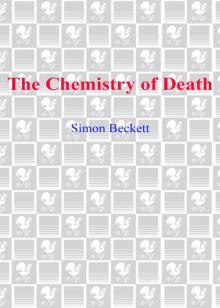 The Chemistry of Death
The Chemistry of Death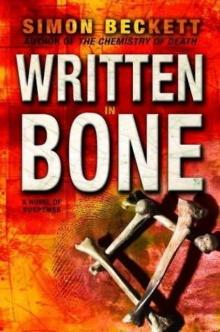 Written in Bone
Written in Bone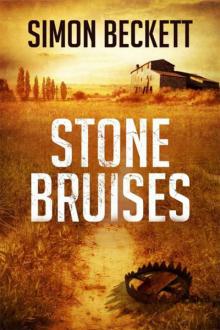 Stone Bruises
Stone Bruises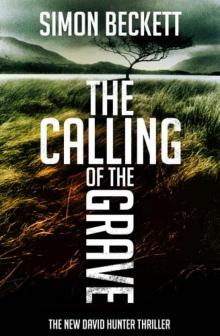 The Calling of the Grave
The Calling of the Grave Whispers of the Dead
Whispers of the Dead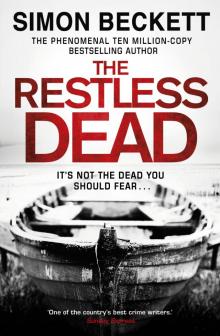 The Restless Dead
The Restless Dead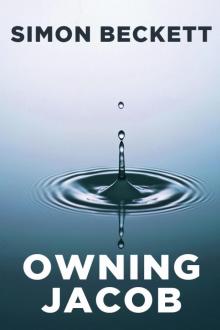 Owning Jacob
Owning Jacob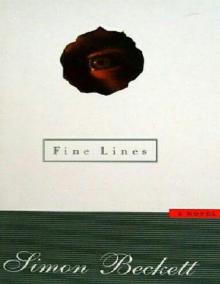 Fine Lines
Fine Lines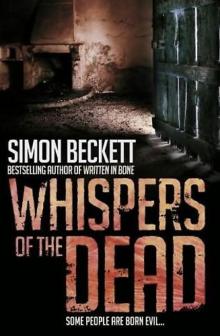 Whispers of the Dead dh-3
Whispers of the Dead dh-3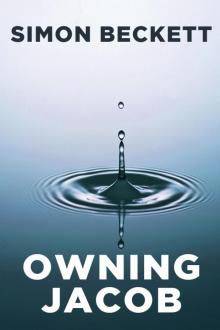 Owning Jacob (1998)
Owning Jacob (1998)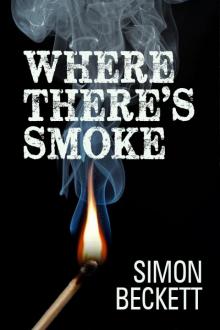 Where There's Smoke (1997)
Where There's Smoke (1997)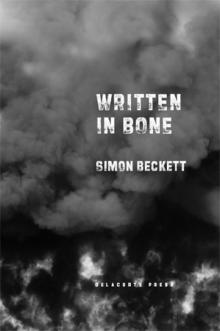 Written in Bone dh-2
Written in Bone dh-2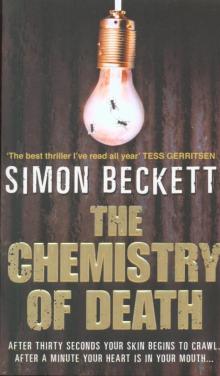 The Chemistry of Death dh-1
The Chemistry of Death dh-1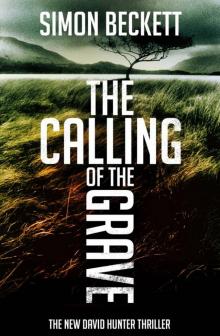 The Calling Of The Grave dh-4
The Calling Of The Grave dh-4